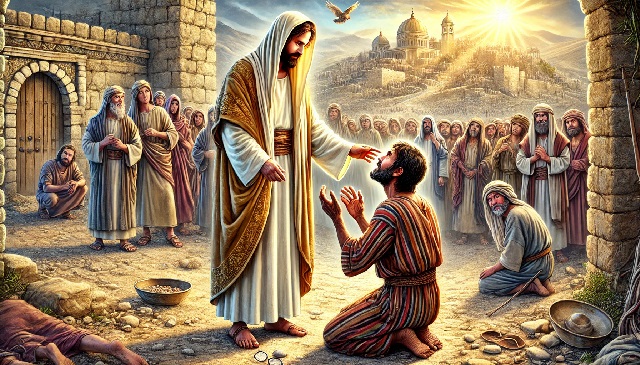My dear friends,
Mark 10:46-52 describes the encounter between Jesus and Bartimaeus, a blind beggar.

Christ Heals Bartimaeus
Created by ChatGPT-4o/DALL-E3, 2024-10-25
Bartimaeus son of Timaeus, a blind beggar, was sitting by the roadside.
When he heard that it was Jesus of Nazareth, he began to shout out and say,
"Jesus, Son of David, have mercy on me!"
Many sternly ordered him to be quiet, but he cried out even more loudly,
"Son of David, have mercy on me!"
Jesus stood still and said, "Call him here."
And they called the blind man, saying to him, "Take heart; get up, he is calling you."
So throwing off his cloak, he sprang up and came to Jesus.
Then Jesus said to him, "What do you want me to do for you?"
The blind man said to him, "My teacher, let me see again."
Jesus said to him, "Go; your faith has made you well."
Immediately he regained his sight and followed him on the way.
Intriguingly, the question Jesus poses to Bartimaeus is identical to the one he asked his disciples James and John in Mark 10:36, “What do you want me to do for you?” This question, my friends, is of utmost importance in both instances, but the responses and their implications differ drastically.
James and John, when asked this question, sought positions of honor and power in Jesus's future kingdom. Their request was born from personal ambition, a desire for recognition, an attachment to the idea of status. However, Jesus explains that such honors are not his to give; they are prepared by his Father. The path to spiritual greatness, as Jesus teaches, lies not in seeking power and prestige, but in serving others, embodying compassion and humility.
Contrastingly, when Bartimaeus is asked the same question, he simply pleads, “Rabbi, I want to see.” Unlike James and John, his desire is not for status or glory, but for a fundamental human capability - sight. Jesus's response to Bartimaeus differs significantly from his earlier reply. He tells Bartimaeus, “Go, your faith has healed you.” Immediately, Bartimaeus gains his sight and follows Jesus along the road.
What can we glean from these differences? In the Buddhist tradition, we speak often of the importance of right intention, and this parable mirrors that teaching beautifully. Both parties approach Jesus with requests, yet their motivations differ greatly. James and John seek to enhance their egos, clinging to worldly desires. Bartimaeus, on the other hand, seeks liberation from his physical limitations, motivated by faith and a desire to better perceive the world, both literally and spiritually.
Jesus's different responses also provide insight. He reminds James and John that seeking power and honor is not the path to spiritual fulfillment. Instead, they should aim to serve and nurture compassion. To Bartimaeus, Jesus grants his request, acknowledging his faith as the healing force. This is a wonderful example of how a pure, humble heart opens doors to miracles and transformation.
In Buddhism, we emphasize the idea of selflessness and compassion, just as Jesus illustrates in his interactions with James, John, and Bartimaeus. Spiritual growth isn't about gaining power or seeking personal gain; it is about cultivating understanding, compassion, and love for all beings.
As we move through life, let us remember to question our intentions regularly. Are we acting out of self-interest or with the desire to serve and understand others? Are our requests to the universe born of ego or of an earnest yearning for growth and healing? The answers to these questions can guide our actions and help us to align more closely with our highest spiritual ideals.
Bartimaeus asked, out of sincere faith and a desire for healing, and received sight. May we all approach our spiritual journey with similar faith and sincerity, casting aside ego and embracing compassionate service. Let us seek to truly "see," like Bartimaeus.